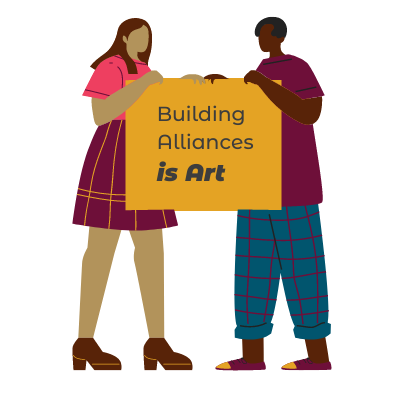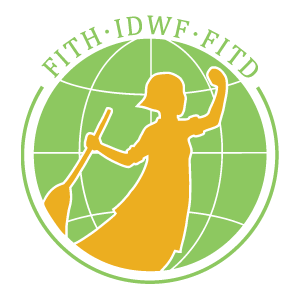Building Alliances is Art

Co-organized by Domestic Workers Federation (IDWF) and AWID, this closed conversation brought together domestic workers (DW) and feminist allies across regions to share knowledge about DW and how to support their strategies for Emancipation. This first exchange focused on the importance of alliances to support immediate concerns and current advocacy efforts of IDWF affiliates - as our joint struggles lie at the intersection of historical feminist struggles for emancipation from heteropatriarchy, racism, colonialism, and labor exploitation in capitalist societies.
This is especially important considering the economic burdens and health risks in the wake of COVID-19. Not only have DW been historically denied job security, appropriate wages and associated labor protections; they are at the forefront of the care crisis, maintaining livelihoods and economies, and at a higher risk of both being affected by the pandemic and the policy responses to the pandemic, such as border closures, lockdowns, and curfews.
In the first part of the conversation, domestic workers from around the world shared positive examples of alliances and strategic relationships that supported their organizing within their domestic workers union.
Internally, many smaller unions of DW are establishing strategic alliances within their sector, by being part of bigger, national platforms or union federations, which is especially important for “raising the voices of smaller unions” (Gita) and pushing for legislation supporting the rights of DW. Other speakers highlighted the importance of external international alliances, for example with the IDWF, the International Labour Organization (ILO), Women in Informal Employment: Globalizing and Organizing (WIEGO) or AWID, and their essential role in supporting, guiding, empowering and offering training to smaller unions (Namibia and Jamaica) - all of which is enabling many domestic workers leaders to continue lobbying governments and fighting for the ratification of the ILO Domestic Workers Convention C189 (Nellie). However, one speaker (Wendy) also reminded the participants about the importance of having interpersonal alliances, not losing sight of the local level while working nationally or transnationally, and continuing to foster individual connections and relationships with all domestic workers, as “every problem has its own particularities”.
One speaker (Shirley) emphasized the importance of social dialogue and strengthening the capacities of local unions to engage in social dialogue, especially for those using tripartite models (which implies collaborating with the private sector and the government). This has been extremely helpful for one union (the Jamaican Workers Association) during COVID-19. Through their alliances with NGOs, the private sector and the government, they gained access to training as well as valuable resources such as computers, packages and tablets for domestic workers and their children. Two unions (the Namibia Domestic Workers Union and the Jamaican Workers Association) have also been engaging with the media, in order to increase the visibility of the struggles of domestic workers and gain more public support: “we are free to go to the national broadcasting to announce and cry and raise our faces for domestic workers and go outside to say ‘this is what we want’, ‘this is the truth that belong to domestic workers’ ”. (Nellie)
Externally, one speaker (Nasrikah) mentions that collaborating across different sectors can often be difficult, as other sectors do not necessarily understand the particularities, issues, difficulties and the social, economic and work-related obstacles that domestic workers are facing, many of whom are women of colour, indigenous women and migrant women. This is why, as the moderator summarized, more awareness has to be raised about the lives and struggles of domestic workers, not only when working with other sectors but also when working with governments, and the private sector.
Internally, within the same working sector, peoples’ realities and identities are also different - which can lead to certain difficulties and misunderstandings. Indeed, one speaker (Gilda) mentioned the challenge of making space for and accommodating the needs of every affiliate organization that is part of a wider federation or national union, especially when a national alliance grows very fast, as there is a risk for the space to become less accessible to some communities. This is why, in one case (the National Domestic Workers Alliance in the US) special programs were created to target communities that are left behind (for example black communities and diasporas).

In terms of the different local contexts that can impede alliance building, some governments (such as the Malaysian government) do not acknowledge domestic workers as workers (they still call them domestic servants), which means domestic workers cannot benefit from essential rights, like a minimum wage, social security or leave days (Nasrikah). This also means that domestic workers cannot formally form a union or engage in tripartite agreements. Very similarly, another speaker (Gita) highlighted the issue of caste discrimination and how, because most domestic workers in India are of lower caste, they are not considered as workers. Someone else (Mirella) also mentioned issues related to the growing far right movements in their country (in Switzerland), which are mobilizing against migration and legislation protecting migrant domestic workers. Another speaker (Francia) talked about systemic issues of sexism and transphobia in their country (Nicaragua), and the fact that unions are male dominated - which poses many challenges in terms of articulating a gender perspective. The rights of trans people are not recognized, which means they do not have access to social security rights or contracts, and they experience terrible labor exploitation.
This is why, as one speaker would say (Wendy), it is essential to center intersectionality in all union work, not only to fight for better wages and rights, but also to fight against all forms of discrimination. And to continue weaving and nurturing alliances internally and externally, because “united we are stronger” (Francia).
